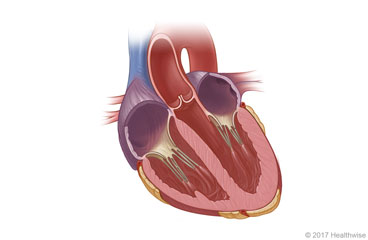
Overview
A premature heartbeat happens when the heart beats earlier than it should. This briefly interrupts the heart's rhythm. You do not usually feel the early heartbeat, and the next beat is stronger. To many people, this feels like a skipped heartbeat or a flutter. This heartbeat is also called a premature ventricular contraction (PVC).
If you have no heart problems, premature heartbeats that happen once in a while are not a cause for concern. Most people have them at some time. They may happen more often if you use caffeine or alcohol or are under stress.
You may have tests to check for a cause of the premature heartbeats. Most people do not need treatment. But some people may take medicine or have a procedure called ablation to prevent these heartbeats and to relieve symptoms.
Follow-up care is a key part of your treatment and safety. Be sure to make and go to all appointments, and call your doctor if you are having problems. It's also a good idea to know your test results and keep a list of the medicines you take.
How can you care for yourself at home?
- Limit caffeine and other stimulants if they trigger premature heartbeats.
- Try to manage stress.
- Do not smoke or allow others to smoke around you. If you need help quitting, talk to your doctor about stop-smoking programs and medicines. These can increase your chances of quitting for good.
- Get at least 30 minutes of exercise on most days of the week. Walking is a good choice. You also may want to do other activities, such as running, swimming, cycling, or playing tennis or team sports.
- Eat heart-healthy foods.
- Stay at a healthy weight. Lose weight if you need to.
- Limit alcohol to 2 drinks a day for men and 1 drink a day for women. Too much alcohol can cause health problems. If drinking alcohol causes more premature heartbeats, do not drink it.
- If your doctor prescribes medicine, take it exactly as prescribed. Call your doctor if you think you are having a problem with your medicine.
When should you call for help?
Call 911 anytime you think you may need emergency care. For example, call if:
- You passed out (lost consciousness).
Call your doctor now or seek immediate medical care if:
- You are dizzy or lightheaded, or you feel like you may faint.
- You are short of breath.
Watch closely for changes in your health, and be sure to contact your doctor if you have any problems.
Where can you learn more?
Go to http://www.healthwise.net/patientEd
Enter H908 in the search box to learn more about "Premature Heartbeat: Care Instructions".
Current as of: July 31, 2024
Author: Ignite Healthwise, LLC Staff
Clinical Review Board
All Healthwise education is reviewed by a team that includes physicians, nurses, advanced practitioners, registered dieticians, and other healthcare professionals.

